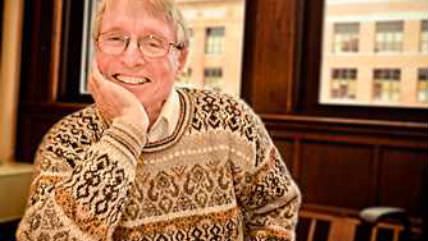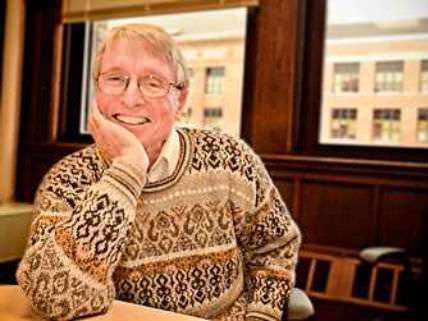John Holland, 'Father of Complexity,' Dies at 86
Pioneer in complex adaptive systems passed away earlier this month


Earlier this month, the computer scientist and psychologist John Holland passed away. Holland is known as the "father of complexity" for being the pioneer in the study of complexity and complex adaptive systems. He studied under Arthur Burks, who worked with the visionary computer scientist John Von Neumann, whom he helped design the first electronic digital computer, and who came up with the idea of the Von Neumann machine, a self-reproducing computer program, before DNA was discovered.
Scott Page writes at the Washington Post:
Holland was fascinated with von Neumann's "creatures" and began wrestling with the challenge and potential of algorithmic analogs of natural processes. He was not alone. Many pioneers in computer science saw computers as a metaphor for the brain.
Holland did as well, but his original contribution was to view computation through a far more general lens. He saw collections of computational entities as potentially representing any complex adaptive system, whether that might be the brain, ant colonies, or cities.
His pursuit became a field. In brief, "complex adaptive systems" refer to diverse interacting adaptive parts that are capable of emergent collective behavior. The term emergence, to quote Nobel-winning physicist Phil Anderson's influential article, captures those instances where "more is different." Computation in the brain is an example of emergence. So is the collective behavior of an ant colony. To borrow physicist John Wheeler's turn of phrase, Holland was interested in understanding "it from bit.'"
Read the rest of Page's write-up at the Post.
Readers interested in introducing themselves to Holland should read Signals and Boundaries: Building Blocks for Complex Adaptive Systems, which applies the ideas of complexity to biology, markets, and even governments, and vice versa.
Editor's Note: As of February 29, 2024, commenting privileges on reason.com posts are limited to Reason Plus subscribers. Past commenters are grandfathered in for a temporary period. Subscribe here to preserve your ability to comment. Your Reason Plus subscription also gives you an ad-free version of reason.com, along with full access to the digital edition and archives of Reason magazine. We request that comments be civil and on-topic. We do not moderate or assume any responsibility for comments, which are owned by the readers who post them. Comments do not represent the views of reason.com or Reason Foundation. We reserve the right to delete any comment and ban commenters for any reason at any time. Comments may only be edited within 5 minutes of posting. Report abuses.
Please to post comments


...before DNA was discovered.
To be overly pedantic, DNA was first discovered in 1869, although its role wasn't well understood until much later and the double helix structure wasn't discovered until 1953.
That is interesting, have you a link? Thanks
I think he has DNA confused with genetics.
Von Neumann machine, a self-reproducing computer program
This is kind of right, in that Von Neumann did some theoretical work on self-reproducing machines. But the term usually refers to the Von Neumann computer architecture, which essentially means that programs and data are stored in the same memory.
As opposed to an Alfred E. Neuman machine, which essentially means [insert something witty here, it's too early for me].
You said "insert"....huh huh, huh huh, huh huh...
/Alfred E. Neuman/B&B joke
Don't worry about it
I am viewing the thing which you have brought into being....
Wes Craven, reason? Chopped liver?
What - I heard he was hanging out at Lou Reed's over the weekend. Something happen?
No shit. He showed up at Lou's place yesterday.
Dammit.
Yeah, I'd never heard of this 'Father of Complexity,' but I'm definitely mourning the 'Father of Freddy.'
Wes Craven died? He scaring the shit out of god now.
Re: Stammer,
Here ya go: http://reason.com/blog/2015/08.....wes-craven
Emergent minor-collectives are hunted down and gutted by treadmills with prisons.
One of these days I'm going to make sense of one of your comments. On that day I will have myself voluntarily committed.
"More is different." That's great. It's where reductionism leaves off and complexity begins really.
Hidden Order is in my opinion a better introduction to Holland's work. Fair amount of math that can be skipped, but a great set of explanations of what mechanisms make Complex Systems work.
My work desk has seen all sorts of reference books go on and off its shelves, but that book continues to sit there to this day.
Unlike the Market which, we all know, needs to be regulated.
Tony the Marxian told me so. It must be true.